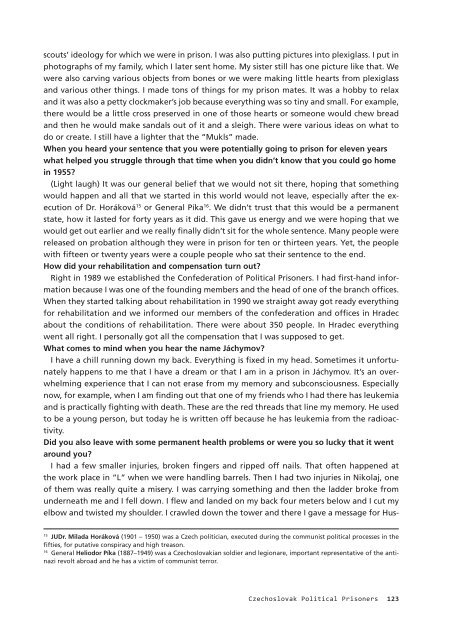Czechoslovak Political Prisoners - über das Projekt Political ...
Czechoslovak Political Prisoners - über das Projekt Political ...
Czechoslovak Political Prisoners - über das Projekt Political ...
Create successful ePaper yourself
Turn your PDF publications into a flip-book with our unique Google optimized e-Paper software.
scouts’ ideology for which we were in prison. I was also putting pictures into plexiglass. I put in<br />
photographs of my family, which I later sent home. My sister still has one picture like that. We<br />
were also carving various objects from bones or we were making little hearts from plexiglass<br />
and various other things. I made tons of things for my prison mates. It was a hobby to relax<br />
and it was also a petty clockmaker’s job because everything was so tiny and small. For example,<br />
there would be a little cross preserved in one of those hearts or someone would chew bread<br />
and then he would make sandals out of it and a sleigh. There were various ideas on what to<br />
do or create. I still have a lighter that the “Mukls” made.<br />
When you heard your sentence that you were potentially going to prison for eleven years<br />
what helped you struggle through that time when you didn’t know that you could go home<br />
in 1955?<br />
(Light laugh) It was our general belief that we would not sit there, hoping that something<br />
would happen and all that we started in this world would not leave, especially after the execution<br />
of Dr. Horáková 15 or General Píka 16 . We didn’t trust that this would be a permanent<br />
state, how it lasted for forty years as it did. This gave us energy and we were hoping that we<br />
would get out earlier and we really finally didn’t sit for the whole sentence. Many people were<br />
released on probation although they were in prison for ten or thirteen years. Yet, the people<br />
with fifteen or twenty years were a couple people who sat their sentence to the end.<br />
How did your rehabilitation and compensation turn out?<br />
Right in 1989 we established the Confederation of <strong>Political</strong> <strong>Prisoners</strong>. I had first-hand information<br />
because I was one of the founding members and the head of one of the branch offices.<br />
When they started talking about rehabilitation in 1990 we straight away got ready everything<br />
for rehabilitation and we informed our members of the confederation and offices in Hradec<br />
about the conditions of rehabilitation. There were about 350 people. In Hradec everything<br />
went all right. I personally got all the compensation that I was supposed to get.<br />
What comes to mind when you hear the name Jáchymov?<br />
I have a chill running down my back. Everything is fixed in my head. Sometimes it unfortunately<br />
happens to me that I have a dream or that I am in a prison in Jáchymov. It’s an overwhelming<br />
experience that I can not erase from my memory and subconsciousness. Especially<br />
now, for example, when I am finding out that one of my friends who I had there has leukemia<br />
and is practically fighting with death. These are the red threads that line my memory. He used<br />
to be a young person, but today he is written off because he has leukemia from the radioactivity.<br />
Did you also leave with some permanent health problems or were you so lucky that it went<br />
around you?<br />
I had a few smaller injuries, broken fingers and ripped off nails. That often happened at<br />
the work place in “L” when we were handling barrels. Then I had two injuries in Nikolaj, one<br />
of them was really quite a misery. I was carrying something and then the ladder broke from<br />
underneath me and I fell down. I flew and landed on my back four meters below and I cut my<br />
elbow and twisted my shoulder. I crawled down the tower and there I gave a message for Hus-<br />
15 JUDr. Milada Horáková (1901 – 1950) was a Czech politician, executed during the communist political processes in the<br />
fifties, for putative conspiracy and high treason.<br />
16 General Heliodor Píka (1887–1949) was a <strong>Czechoslovak</strong>ian soldier and legionare, important representative of the anti-<br />
nazi revolt abroad and he has a victim of communist terror.<br />
<strong>Czechoslovak</strong> <strong>Political</strong> <strong>Prisoners</strong> 123


